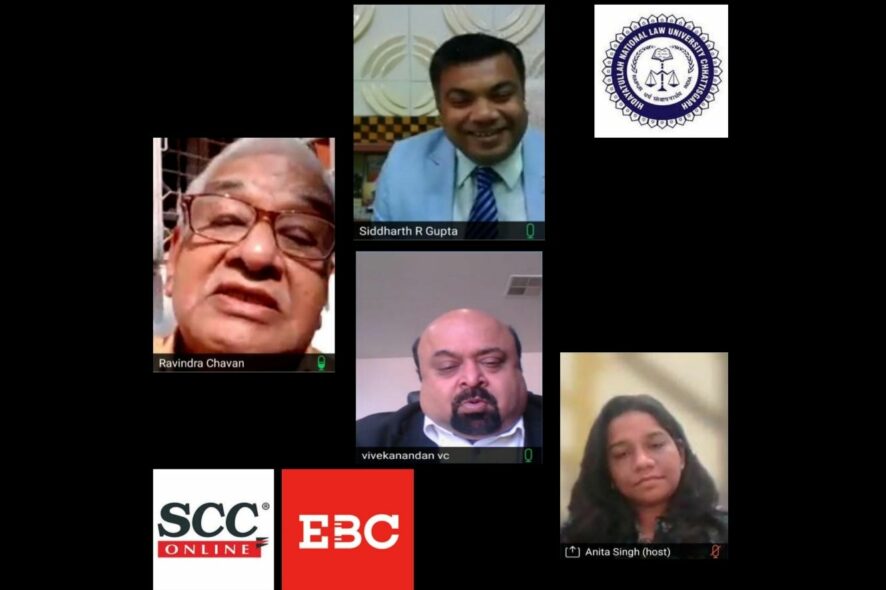‘Hybrid Courtrooms are not only the ‘future’, they are also the ‘existing necessity’ of our Judicial System and the year 2022 will witness significant internalisation of Hybrid Courtrooms in the overall setup of Court infrastructure in the country’, so said Mr Justice R C Chavan, Vice-Chairman of the National E-Committee, Supreme Court of India & the Former Judge, Bombay High Court in the Virtual Session organised by the HNLU, Raipur on the subject ‘Hybrid Courtrooms: Future of Justice Dispensation in Our Country’. The session also witnessed other dignitaries like the Vice-Chancellor, Prof. (Dr.) V C Vivekanandan, HNLU & Mr Siddharth R Gupta, Counsel, High Court of M.P. & Supreme Court of India were also part of the Speakers Panel. The session was organised in collaboration with the Aman Movement & RTI Revolutionary Society wherein SCCOnline and EBC Group were the Knowledge Partners.
The Keynote Speaker of the session, Justice RC Chavan stated that Hybrid Courtrooms are of no prejudice to any stakeholder with anybody opting for any option of appearance; Physical or Virtual through a Video Conferencing facility. The opponents of Virtual Courts must agree and accede to the arrangement of Hybrid Courtrooms for the reason that they always have the option to appear physically if they intend to do so, which allays any apprehension of not being able to put the arguments properly. Justice R C Chavan further states that Hybrid Courtrooms are the need of the century as ever-increasing litigation and work pressure on the Courts demands such an arrangement. It makes the whole justice process cheaper, cost-effective and extremely affordable for the litigant to contest any case before the Constitution Courts of Law or the Supreme Court. He emphasizes that the National E-Committee of the Supreme Court led by a dynamic hardworking Chairman Hon’ble Dr. Justice D Y Chandrachud is working day-in and day-out to make the vision of accessible Justice possible for one and all. Justice Chavan further emphasized that the Constitution envisions the goal of accessible Justice for one and all irrespective of their social, geographical or political handicaps and Hybrid Courtrooms go a long way in achieving this goal.
Siddharth R Gupta, Advocate, who was also one of the Speakers, stated that Virtual Courts ensure an inclusive, proportionate and distributive Judiciary with all categories of stakeholders, all the three types of genders being able to participate and perform before the Courtrooms. It provides abundant opportunities to the female and lady-counsels, especially those having children or elder members at home to attend to any case. It thus provides a level playing field for them to expose their qualifications and competence. Gupta at the end of the session beseeched the National E-Committee of the Supreme Court of India to come up with mandatory Bye-Laws and Model Set of Regulations mandating all the High Courts or Tribunals to adopt Hybrid procedure for hearing cases before them without any exceptions. Gupta expressed his reservations on the High Courts doing away with the Hybrid Mode of Hearing as a highly regressive decision, when they must be leading the institutions from the front to make Justice accessible.
Prof. (Dr.) V C Vivekanandan, Vice-Chancellor, HNLU, Raipur stated that the Judicial System exists for the litigants and for the litigant only. He reminisced how along with Justice Krishna Iyer he had supported the striking Employee Unions in the late 1980s and early 1990s when computers were being introduced for data entry processes in all the nationalised banks of the country. Later on, quoting Justice Krishna Iyer, Prof. Vivekanandan mentioned that in later years they realised the biggest mistake they had committed by supporting the strike against the introduction and internalization of technology in the banking sector. Prof Vivekanandan also said though we are working in the 21st century but are processes are of the 20th century and our laws are of the 19th century; we are governed by substantive and procedural laws which are still ante dated and are of decades of 19th century, which are completely ill-equipped to give us a vision to move forward. He also said that the adoption of Hybrid Mode for conducting cases can be an effective means of faster resolution in Alternative Disputes Mechanisms, like Arbitrations, Mediations and would prove to be highly efficient and affordable for all those intending to resort to it.
The lecture ended with the vote of thanks delivered by Prof (Dr.) Uday Shankar, Registrar, HNLU, Raipur. The introductory address was given by Mr Rahul Singh, Information Commissioner, State Information Commission, Madhya Pradesh.






